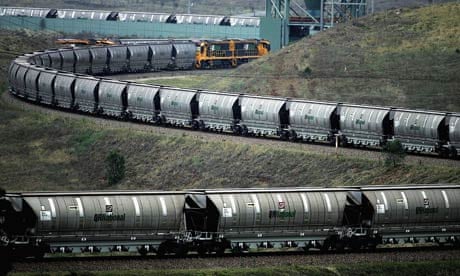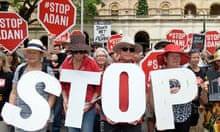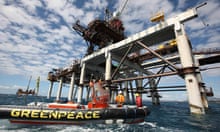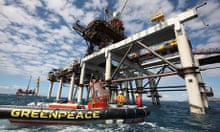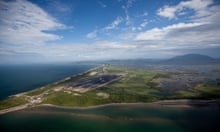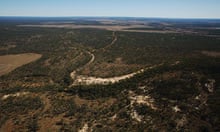Plans to open up a new Australian "coal export rush" would turn a single Queensland region into the seventh largest contributor of carbon dioxide emissions on the planet, undermining international efforts to keep global warming below 2C, a new report has warned.
Nine proposed "mega mines" in the Galilee Basin would, at full capacity, result in 705m tonnes of CO2 released into the atmosphere, according to a Greenpeace Australia analysis. This level of emissions would surpass those of all but six nations in the world. By comparison, the UK emitted 549.3 million tonnes of CO2 from all sources in 2011.
Greenpeace said that the nine mines' production capacity of 330m tonnes of coal a year for export would represent an "unprecedented" increase in the scale of coal mining in Australia. The mines' maximum output, primarily aimed at servicing the burgeoning Chinese and Indian markets, would nearly double Australia's total 2010/11 coal production of 352m tonnes and eclipse its export total of 283m tonnes.
The Greenpeace report states that the mines will only be able to launch and operate at capacity if global appetite for coal continues to grow strongly. This scenario would in effect nullify an internationally agreed goal to keep the increase in average global temperatures below 2C from pre-industrial levels.
Greenpeace warns that a growth in coal-fired emissions represented by the nine Queensland mines would be in line with the International Energy Agency's model of a "catastrophic" 6C rise in temperatures.
"At a time when the science could not be clearer on the need to reduce global carbon emissions, and when governments worldwide are shifting to a low-carbon economy, exploiting the Galilee Basin is a reckless proposition," the report states. "It is imperative that the Galilee Basin coal reserves remain in the ground."
The Alpha coal mine, a joint venture between Indian conglomerate GVK and Gina Rinehart's Hancock Coal, last month became the first major Galilee Basin project to be given state and federal government approval, despite protests from environmentalists and farmers.
The mine, which will bring an estimated AU$1bn (£642m) into the Queensland economy, will have the capacity to create 64.7m tonnes of CO2 – the equivalent of Israel's entire 2009 emissions from fuel combustion.
The other eight mines are yet to be given the green light by ministers. Adani, another Indian mining firm, hopes to build a new town for 12,000 people to service its big Carmichael mine, which would produce up to 60m tones of coal a year.
Greenpeace's report argues that the expansion in Queensland coal mining will damage the nearby Great Barrier Reef through coral bleaching from increased temperatures, but also in the shorter term due to the development of new ports and shipping lanes in order to transport the coal overseas.
In June, a UN report expressed "extreme concern" over the level of development along the Great Barrier Reef coast, calling for all building to cease until an assessment of the ecosystem's health was carried out.
The Greenpeace Australia campaigner Georgina Woods, author of the new coal report, said: "Australia has just pretended up until now that coal exports aren't part of the problem but it's time that we started talking about it if we want to keep treasures like the Great Barrier Reef."
"These proposed mines need to be taken off the table and development along the Great Barrier Reef coast needs to be ruled out. The topic of coal exports is a very immature conversation in Australia but we need to start that conversation."
Australia is itself a heavy user of coal, as well as a leading exporter. Although the country has committed to cutting its own carbon emissions by 5% on 2000 levels by 2020 and introduced carbon pricing in July, the federal government has been accused of botching its attempts to move the country away from fossil fuels. This month, the government abandoned plans to pay five of Australia's dirtiest coal-fired power generators to close down, despite already handing them $1bn in taxpayer money to cushion the impact of carbon pricing.
